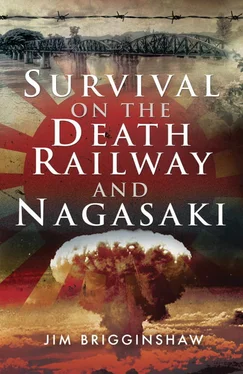Captain Higgins was one who let the joy of being released get the better of his judgment. He drank too much sake, and then sat naked in the huge brick bath looking out at a world of freedom through fingers pressed together in a circle to simulate field glasses.
The other three senior officers took over command and, with the help of a security detail of the fittest prisoners, gradually restored order.
Through the camp’s radio transmitter, contact was made with the American forces who told the prisoners to paint ‘POW’ in yellow letters on the roofs of camp buildings so they could be identified from the air.
After this was done, three four-engined B29s from Guam and Saipan circled the town, dropping food and clothing in forty-four-gallon steel drums halved and welded together.
It was a fiasco. The containers were too heavy for the parachutes, and many broke free and crashed to the ground, bursting open and scattering their contents everywhere. Some drums fell in the town streets, while others crashed through the roofs of houses.
Little could be salvaged from the burst containers. Chocolates, fruit salad, biscuits and other longed-for luxuries were mixed with flea powder and disinfectants. The Americans had included the flea powder after being told the prisoners were infested with bugs. It hadn’t dawned on them that putting poisonous powder in the drums together with food wasn’t a wise move.
Hungry as they were, the prisoners refused the contaminated luxuries, but Japanese children scooped up handfuls of broken chocolate covered in flea powder and ate it, unaware that it could kill them.
Fortunately, ample quantities of tinned food survived the heavy landings. The hungry men ate heartily, and used any surplus to trade with Japanese civilians. Hoping to swap tinned food for fresher produce, Bodero and his mates took a supply of it out to the country farms.
They didn’t know how they’d be received by ordinary Japanese, but at the first farm they came to, they were made welcome by the farmer, his wife, their seventeen-year-old daughter and her elderly grandmother. Only the wife had a good command of English, having been a nurse in a large hospital. Now in their fifties, the couple had bought the farm in better days.
When the farmer, with his wife interpreting, learnt the reason for the men’s visit, he readily agreed to swap his fresh produce for the tinned variety. When the transaction was completed, he insisted that the men stay and eat with them. The food, supplemented by cherry wine and carrot brandy, was an unbelievable treat for men who couldn’t remember the last time they’d had a home-cooked meal.
They ate Japanese-style seated on cushions around a low table. The women didn’t sit with them, but stood close by, ready to attend to their every need. The English-speaking wife told them it was traditional in Japan for women to do this; the man was the undisputed head of the household.
The surprised Australians said the women in their country had equal status with men.
Equally surprised, she told them that women in Japan did heavy work in the fields, often behind an ox-pulled plough. ‘If some farms do not have an ox, the woman pulls the plough.’
When the men said an Australian woman could please herself whether she helped her husband, the wife interpreted for her husband. The farmer shook his head in dismay and mumbled something in his own language.
‘What did papa-san say?’ Bodero asked.
‘He say no wonder Nippon went close to winning the war.’
Everybody laughed. It was an enjoyable afternoon, almost like being back home. The friendliness was genuine, almost overpowering.
Much of Jim Bodero’s hatred of the Japanese dissipated that day. This family made him realise that the blame for the war rested not with the Japanese people, but with the militarist ambitions of their warlords.
During the afternoon, the family album was produced. As the wife turned the pages, she quickly skimmed over a photograph of a young naval officer in his twenties in full Japanese uniform.
Jim turned back to it and asked who it was.
Tears rolled down the woman’s cheeks. Sobbing, she told him the photograph was of their only son, who had lost his life in a naval battle somewhere in the Pacific. She wept, she said, not because of the loss of a son, but because of shame that one of the family had been killing other human beings in the war. She had tried to hide the picture because showing it to those her son had been fighting would add to the shame.
Jim Bodero found himself weeping with her. He never forgot her tears, nor her hatred of war. It did much to help him forgive those who had treated him so badly.
When they embraced and wept together in that Japanese house, he had never felt so homesick for those he’d left behind in Australia. The woman had treated him as if he was the son she had lost, while far from home, it was as if he had found the mother he had left behind.
The Australians left the Japanese farm that day with changed views, spiritually enriched and enlightened.
With time on their hands and able to do whatever they wanted, it was inevitable that the freed POWs would get up to some mischief. A group of them, led by none other than Tellemalie, confiscated a steam locomotive from a rail depot.
‘I’ll drive’, Tellemalie said. ‘I’ve had experience as a steam driver.’
Bewildered by the array of instruments, he had no idea how to start the thing. One of the men with him had worked for the railway back home, so he took over, and with him at the controls, the loco was driven out of the depot with former prisoners of war hanging off it. They had no idea where they were heading, no knowledge of Japanese railway signals and no thought that other traffic might be on the line.
On the open track, it was full steam ahead. With yahooing Australians perched everywhere, the loco shot through sidings and stations in a cloud of smoke, leaving female signal operators gaping in astonishment.
It was a miracle that there was no other traffic on the line. Only when a party of civilian police officers risked life and limb by standing in the centre of the railway track did they bring the loco to a hissing halt.
Japanese police! Now the men were for it.
However, instead of throwing them all into a cell, the police drove them back to camp and asked them not to do it again.
How times had changed! Not so long ago, on another railway, the Japanese would have executed them for not bowing to them, let alone stealing a locomotive.
Another group foraging around the town found a huge godown, a Japanese warehouse, packed floor-to-ceiling with thousands of American International Red Cross parcels, mostly unopened. Those that had been broached were missing only cigarettes. Now it became clear where the Japanese guards had been getting the American brands they smoked.
Cigarettes, had they been issued to the prisoners they were meant for, wouldn’t have saved any lives, but the food that had been left in the parcels, a whole warehouse full of it, certainly would have if it had been issued to the starving men as the Red Cross intended, one parcel per man each month.
In three and a half years, the prisoners had received only one issue of parcels, one parcel for every ten men, and even then they had had to steal the contents.
Their captors’ reason for stockpiling the relief parcels was typical Japanese logic. A Red Cross parcel a month to each man would have resulted in less debilitated bodies. Starving and exhausted, they weren’t likely to try to escape like the well-fed Japanese POWs in Australia had at Cowra. Men who were weak from starvation posed no threat.
It was this kind of thinking that ruined Red Cross efforts to relieve the suffering.
Changed Japanese attitudes became apparent when Bodero, Barnstable and a few of their mates were allowed into the town movie cinema free of charge. However, after sitting through a long and boring film with unintelligible dialogue, they couldn’t imagine anyone paying to get in.
Читать дальше












